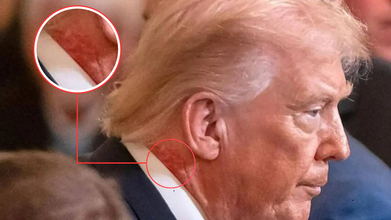- Health Conditions A-Z
- Health & Wellness
- Nutrition
- Fitness
- Health News
- Ayurveda
- Videos
- Medicine A-Z
- Parenting
Your Common Painkillers May Be Helping Superbugs Grow Resistant

Credits: iStock
Most of us just grab ibuprofen for a headache or paracetamol for a fever without giving it a second thought. Painkillers like these are pantry staples, safe enough to purchase over the counter and reliable for generations but emerging research indicates they could be unwittingly driving one of the world's most urgent health challenges: antibiotic resistance.
A ground-breaking University of South Australia study has discovered that paracetamol and ibuprofen not only lead to bacterial resistance by themselves but can enhance it when combined especially when taken with antibiotics. That discovery overturns long-established beliefs about resistance formation and provokes question marks over how commonly used medicines are rewriting the rules for how bacteria adapt.
The World Health Organization (WHO) has designated antimicrobial resistance as one of the greatest threats to health, food security, and development worldwide. In 2019, bacterial resistance was a direct cause of 1.27 million deaths across the globe. These "superbugs" occur when bacteria evolve in such manners that antibiotics are no longer useful, transforming once-treatable infections into potentially lethal ones.
The finger of blame has long been pointed at the overuse and misuse of antibiotics prescribing them when they are not necessary, not finishing a course, or using them as pesticides. But now this new study puts a sinister spin on things, even non-antibiotic drugs could be contributing to helping bacteria get one over on advanced medicine.
The South Australia researchers studied how ubiquitous non-antibiotic drugs interact with ciprofloxacin, an antibiotic used to treat infections of the gut, urinary tract, and skin. The researchers emphasized Escherichia coli (E. coli), a bacterium that often results in these infections.
When E. coli was given ciprofloxacin alone, mutations happened as anticipated. But when ciprofloxacin was given in combination with ibuprofen and paracetamol, mutations went through the roof. The bacteria not only developed resistance against ciprofloxacin but also demonstrated resistance against several other antibiotics belonging to various categories.
Both paracetamol and ibuprofen seemed to trigger bacterial defense mechanisms that flush out antibiotics, rendering them much less potent. In effect, the medications were preparing bacteria to be resistant to treatment.
Polypharmacy and the Aged Care Connection
One of the most disturbing implications of the results is for vulnerable populations, particularly for older adults in long-term care. Residents in aged care homes are often prescribed several medications painkillers, blood pressure medications, sleep medication, cholesterol-lowering drugs, and others. This "polypharmacy" presents the ideal condition for gut bacteria to be exposed to drug combinations that fuel resistance.
As lead researcher for the study, Associate Professor Rietie Venter said, "Antibiotics have been used for decades to treat infectious illnesses, yet overuse and misuse across the globe have fueled a worldwide increase in antibiotic-resistant bacteria. This research indicates that the issue is greater and more profound than antibiotics alone."
What Are The Other Medications Under Scrutiny?
The research did not end at paracetamol and ibuprofen. Scientists also experimented on nine widely prescribed drugs, such as diclofenac for arthritis, furosemide for blood pressure, metformin for diabetes, atorvastatin for cholesterol, tramadol for pain after surgery, temazepam for insomnia, and pseudoephedrine for nasal congestion.
While not every drug caused the same degree of alarm, the findings added to a larger message: antibiotic resistance is no longer just an issue of antibiotics alone. Common medications the ones you have in bathroom cabinets and bedside tables around the globe could be part of the solution to resistance.
It's easy to think of antibiotic resistance as an intangible problem something that happens in hospitals or somewhere far away in the world. But it's already impacting lives around the world. Resistant bacteria complicate simple infections, increase healthcare costs, and pose a risk of complications and death.
If over-the-counter medications such as ibuprofen and paracetamol are fueling resistance, then millions of individuals unknowingly might be part of the issue simply by controlling a fever or arthritis. This is not to say these drugs are bad or should be stopped they work and are vital for many sicknesses. But it does indicate that we require a better understanding of how they work with antibiotics and bacteria.
The University of South Australia group is appealing for further research on how various combinations of drugs affect resistance, especially in long-term drug regimen populations. Such information could assist prescribing clinicians in making better-informed choices regarding prescribing and managing medications.
Tamil Nadu Increases Preventative Chickenpox Measures As Cases Rise

Credit: Canva
Tamil Nadu health authorities have ramped up surveillance efforts and implemented preventive and control measures to curb rising chickenpox cases in the state.
The Directorate of Public Health (DPH) and Preventive Medicine has instructed all health officers to intensify active and passive surveillance in all government and private health facilities, schools, colleges and hostels.
They were also directed to ensure that all suspected and confirmed cases are entered into the Integrated Disease Surveillance Programme (IDSP) line list with complete demographic and clinical details.
All medical officers across the state have further been asked to be alert to differentiate chickenpox from other rash illnesses such as measles, rubella, and hand, foot and mouth disease.
This comes weeks after doctors across Pune also warned against the exponential rise in chickenpox cases this winter.
Dr Shirish Kankariya, head of paediatrics at Apollo Hospital Swargate, said he had seen around 15 chickenpox patients in Jan alone, and the current season has brought a visible uptick in cases.
"Chickenpox cases have risen. We are also seeing infections in older children and adult family members, who never had the disease earlier," he told Times of India.
Dr Prateek Kataria, consultant pediatrician and neonatologist at Sahyadri Hospital also noted that out-patient departments (OPDs) have recently seen a large increase confirmed chickenpox cases this year.
He also told the publication: "We are seeing many children with chickenpox in the OPD even among those who have taken both doses of the vaccine. This is expected because the vaccine does not guarantee 100% protection, but vaccinated children usually develop milder illness and do not need hospitalization."
What Is Chickenpox And How Does It Spread?
Chickenpox, caused by the varicella-zoster virus, is extremely contagious and spreads through respiratory droplets or direct contact with someone who is infected. In children, it often starts as a mild rash accompanied by fever, but it can spread quickly in crowded areas.
The virus can also be transmitted through coughing or sneezing, and it is most infectious a day or two before the rash appears and in the early days of the rash. In individuals with weak immunity, the dormant virus may reactivate later in life, causing shingles (herpes zoster).
How To Detect Chickenpox Symptoms Early?
Spotting chickenpox early means looking for general warning signs like fever, fatigue, headache, and loss of appetite, which usually appear one to two days before the rash.
The rash itself starts as tiny red spots that later form fluid-filled blisters and eventually scab over. Paying attention to these early symptoms, especially after known exposure, can help identify the infection sooner.
How To Spot A Chickenpox Rash
The first rash usually shows up as small red bumps on the face, chest, or back. These bumps quickly turn into blisters filled with fluid, which are contagious. Over a few days, the blisters break and crust over, forming scabs. It’s common to see spots, blisters, and scabs all at the same time, according to the CDC.
Stages Of Chickenpox
The Mayo Clinic explains that chickenpox progresses in three main stages:
- Incubation Stage (10–21 days): After exposure, the virus remains inactive. Infected individuals typically show no symptoms during this period.
- Prodromal Stage (1–2 days): Early signs include fever, tiredness, headache, loss of appetite, and body aches. This is also when the virus can start spreading to others.
- Rash Stage (5–10 days): Red, itchy spots appear first on the face and chest, spreading across the body. These spots develop into fluid-filled blisters that scab over within a few days. Mild fever, itching, and discomfort are common during this stage.
Breast Cancer To Reach Over 3.5 Mn By 2050, Deaths To Surge 44% Predicts Lancet Study

Credit: Canva
A new study published in The Lancet Oncology journal today revealed that breast cancer continues to be the most common cancer among women worldwide, and predicted that the number of new cases of the deadly disease will reach more than 3.5 million globally in 2050 -- rising by a third from 2.3 million in 2023.
The Global Burden of Disease analysis with data from 204 countries revealed that despite advancements in breast cancer treatments, yearly deaths from the disease will rise by 44 percent -- from around 764,000 to 1.4 million.
While breast cancer disproportionately impacts countries with limited resources, maintaining a healthy lifestyle, including not smoking, getting sufficient physical activity, lowering red meat consumption, and having a healthy weight were found to prevent over a quarter of healthy years lost to illness and premature death.
“Breast cancer continues to take a profound toll on women’s lives and communities,” said lead author Kayleigh Bhangdia from the Institute for Health Metrics and Evaluation (IHME), University of Washington, US.
“While those in high-income countries typically benefit from screening and more timely diagnosis and comprehensive treatment strategies, the mounting burden of breast cancer is shifting to low- and lower middle-income countries where individuals often face later-stage diagnosis, more limited access to quality care, and higher death rates that are threatening to eclipse progress in women’s health,” Bhangdia added.
Inequalities In Breast Cancer Burden
The study revealed that the rates of new cases remain highest in high-income countries (HICs), but are growing fastest in low-income countries (LICs).
Women in low- and lower-middle-income countries accounted for 27 percent (around 628,000) of new cases globally, exposing likely disparities in timely diagnosis and shortages of quality treatment, including radiotherapy machines, chemotherapy drugs, and pathology labs, and standard treatments.
In 2023, an estimated 2.3 million new breast cancers were diagnosed worldwide in women (with 73 percent or 1.67 million cases occurring in high- and upper-middle-income countries). Of these, 764,000 ended in deaths (with 39 percent or 300,000 deaths occurring in low- and lower-middle-income countries).
Further, the number of years of healthy life lost due to poor health and early death more than doubled from 11.7 million years in 1990 to 24 million years in 2023.
Women in low- and lower-middle-income countries also contribute to more than 45 percent of all the ill-health and early deaths from breast cancer globally (nearly 11 million years of healthy life lost).
Three-fold Rise In Pre-menopausal Breast Cancer
The study reported a three-fold rise in pre-menopausal breast cancer in women aged 55 or older in 2023 -- compared to women aged 20-54 years.
However, rates of new cases have risen in women aged 20-54 years (up 29 percent) since 1990, with rates in older women remaining relatively unchanged.
Major Lifestyle Risk Factors
In 2023, 28 percent of the global breast cancer burden (6.8 million years of healthy life lost to disability, illness, and early death) was linked to six potentially modifiable risk factors. These include:
- High red meat consumption -- linked to nearly 11 percent of all healthy life lost
- tobacco use (including second-hand smoke; 8 percent),
- high blood sugar (6 percent),
- high body mass index (4 percent),
- high alcohol use and low physical activity (both 2 percent)
Substantial progress has been made in reducing the global breast cancer burden linked to high alcohol use and tobacco between 1990 and 2023, which declined by 47 percent and 28 percent, respectively.
Donald Trump's Neck Appears To Have Redness And Rashes, White House Says A Skin Cream Caused It

Credits: AP
Donald Trump is again in the news, this time not for his cognitive conditions and speculations around it, but for a skin rash and redness around his neck. During a Medal of Honor ceremony in the East Room of the White House, many pointed out the redness around his neck and asked if there was any underlying medical reason to it. The close-up photos shows clear red marks around the 79-year-old president's neck.
Also Read: Breast Cancer To Reach Over 3.5 Mn By 2050, Deaths To Surge 44% Predicts Lancet Study
Why Does President Trump Have Red Rashes Around His Neck?
As per the White House, this redness around his neck is due to a skin cream he has been using. However, the White House has not given any specific reason behind the treatment for which the skin cream has been prescribed. "President Trump is using a very common cream on the right side of his neck, which is a preventative skin treatment, prescribed by the White House Doctor,” Sean Barbabella, the president's doctor, said in a statement. “The President is using this treatment for one week, and the redness is expected to last for a few weeks.”
No follow-up questions on the treatment were given, neither any clarity was given on the condition. However, zoomed in photos from as far back as the Board of Peace meeting at the US Institute of Peace on February 19 too show the redness on President's neck.
Topical treatments can sometimes lead to temporary skin irritation, flushing, or redness - especially if they contain active ingredients like retinoids, benzoyl peroxide, alpha hydroxy acids, or prescription-strength dermatological compounds.
Trump’s medical report from his April 2025 physical exams has noted he was on mometasone cream “as needed” for an unspecified skin condition.
Also Read: Ashley Dalton Diagnosed With Incurable Breast Cancer Stands Down From Her Position
Why Do Skin Cream Cause Redness And Rashes?
While this is not true for all creams, some skin cream could make your skin red by increasing the turnover of cells that stimulate collagen production or reduce inflammation.
In this process, the skin may appear red, slightly inflamed, or sensitive – especially in areas like the neck, which tends to have thinner skin than the face.
Common reasons for redness caused by skin cream include:
- Irritant contact dermatitis
- Allergic reaction to ingredients
- Increased blood flow from active compounds
- Over-application of product
- Sun sensitivity after use
- Skin around your neck may especially react more visibly than other areas due to its delicate texture.
When should redness be a concern?
Even though temporary redness from skincare products is usually harmless, doctors say you must always use creams after a prescription and reach out to them in case of:
- Severe burning or itching
- Blistering or peeling
- Swelling of the face or throat
- Symptoms lasting more than a few days
- Signs of infection
- In most cases, discontinuing the product allows the skin to return to normal within a short period.
© 2024 Bennett, Coleman & Company Limited

